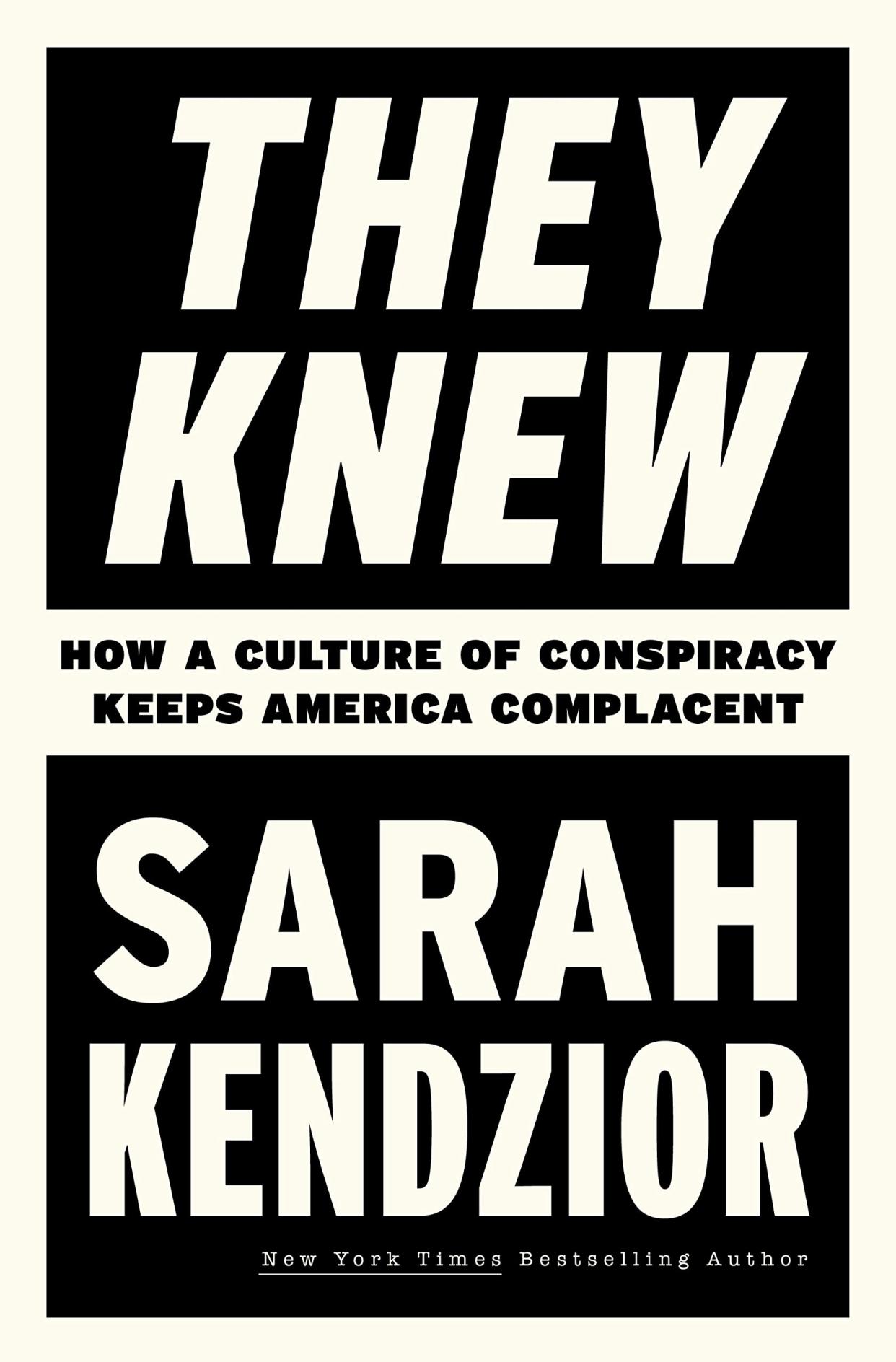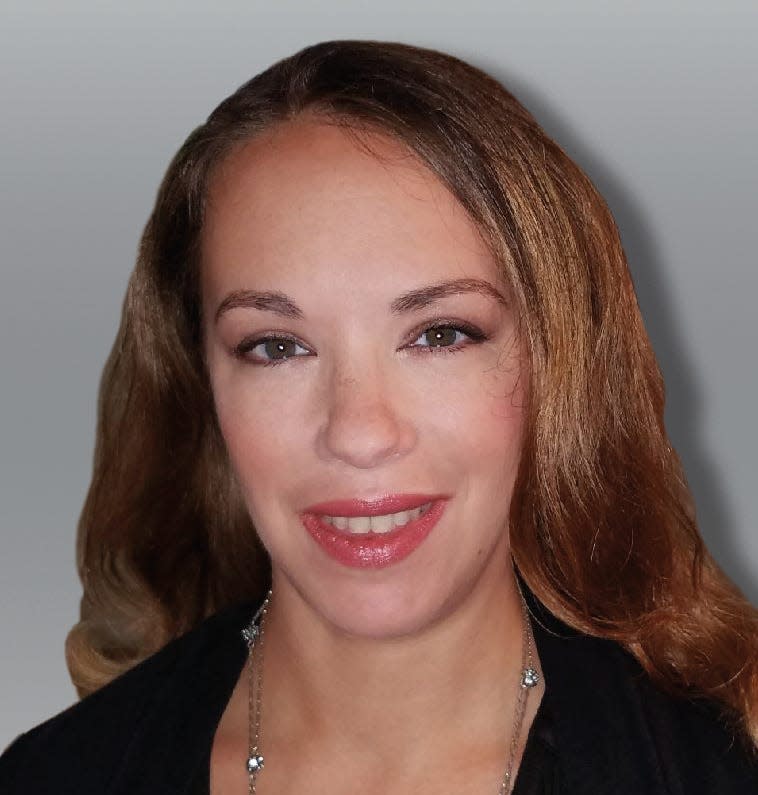Missouri author Sarah Kendzior seeks to reclaim conspiracy theories in 'They Knew'

- Oops!Something went wrong.Please try again later.
- Oops!Something went wrong.Please try again later.
An almost innumerable amount of traits separate Sarah Kendzior from "InfoWars" creator Alex Jones.
A St. Louis-based journalist and scholar, Kendzior studies authoritarian government behaviors — abroad and at home — and covers both the brazen and bracing elements of institutional decline.
Her work finds a wide audience; Kendzior has more than 600,000 Twitter followers (where she calls herself a "nonfiction horror writer") and reaches listeners weekly through the Gaslit Nation podcast she co-hosts with Andrea Chalupa.
Kendzior holds genuine interest in conspiracy theories, but is quick to differentiate between good-faith seekers and the likes of Jones. One class of conspiracy theorist builds from evidence, trying to truly understand America and its history, she said. Those of Jones' ilk deal in propaganda, treating their neighbors as "political weapons."
"He gives conspiracy theorists a bad name — and I think it’s time to take the name back," Kendzior said.
She begins to reclaim the title in her new book "They Knew." The book convenes a crucial conversation about the distinction between conspiracies and conspiracy theories — and how each term plays out in our common life.
Kendzior will visit Columbia this coming week, discussing "They Knew" during a stop at Skylark Bookshop.
More: How M.O. Walsh united small details, big questions in this year's One Read title
The political is personal
If "They Knew" was a concept album, it would unite multiple musical genres. Some passages resemble Woody Guthrie songs, folk ramblers traveling across a land that's yours and mine, underlining how the political is personal to Kendzior and to her children's generation.
Other pages have the volume and sneer of punk rock, calling out bad actors and breathlessly bashing out three chords to find the closest possible version of the truth. Others still sound out a deep blues, lamenting who America is and what she's become.
Kendzior uses some expected suspects as object lessons: Pizzagate, QAnon, Jeffrey Epstein, the Jan. 6 insurrection. She connects dots between how we did or didn't talk about these issues and the impact on our communities. And she unveils similar conspiracies existing more or less in plain sight.
Kendzior also weaves together refreshingly personal observations from living inside 21st-century America, each moment lending color and establishing credibility. She wants readers to know she has an agenda — a "pro-democracy" bias, she said — just not a hidden one.
"I think it’s really important to be as honest as possible about who you are," Kendzior said. "... Where am I coming from? Where do I get my beliefs? What’s the full story?"
Kendzior's interests date back to her time as the "annoying kid who ruined sleepover parties by talking about" the Iran-Contra scandal, she joked.
After studying conspiracies acted out by governments like Uzbekistan's in her Ph.D. program, Kendzior gradually saw her own country bear resemblance, she said. Writing about the slow crawl of authoritarianism led her to be tagged with labels like "alarmist" and "conspiracy theorist."
"I thought, ‘What the hell is wrong with that?’ What is wrong with being a ‘conspiracy theorist’ if you’re taking it out of that negative context?" she said. "I’m somebody who is full of civic inquiry about the more nefarious elements of our government. Does that not make me a model citizen?"
More: Crowded fall arts calendar in Columbia features Roots N Blues, One Read and abundant art
In "They Knew," Kendzior both defines, then works out the differences between conspiracies and conspiracy theories. She also posits how Americans might harness a similar energy for the sake of rebuilding, not undermining civic life.
"Conspiracy" and "conspiracy theory" are "two terms that those in power want us to believe are inseparable so that we remain ignorant of the past and passive about the future," she writes in the author's note.
Conspiracies are agreements between "powerful actors to secretly carry out a plan that protects their own interests, often to the detriment of the public good," Kendzior writes.
Conspiracy theories are "morally neutral and easily accessible," and can bend toward clarity or propaganda.
Conspiracies are "portrayed as elaborate and rare, but they are common and often simple in their basic goals, if not the execution," she adds. They represent "a form of betrayal" in which information is kept from the public.
"A conspiracy theory, when rooted in a sincere desire to find and expose the truth, is a refusal to move on from betrayal," Kendzior writes. "Conspiracy theories are expressions of grief and memory."
Every book is a Missouri book

A transplant to Missouri 17 years ago, Kendzior grounds much of "They Knew" on home turf. She fondly, lyrically describes her adopted home state's natural features and quotes its poets, like T.S. Eliot.
As in previous books, Kendzior also traces Missouri's cultural shifts. Progressing from a state that must be accounted for in presidential elections — and one reflecting the complicated nature of America as a whole — Missouri now mirrors American decline, she said.
"I think every book I write, if it’s about America, it’s still a Missouri book because we still are that reflection, we are that microcosm of the broader crisis," she said.
Kendzior lays local blame at the doorstep of the state legislature, making it clear that while she doesn't believe in Missouri's direction, she believes in Missourians.
"What I do think is there is just profound disillusionment and a profound sense of betrayal," she said. "And it breaks my heart, because I do love this state and I’m living here by choice."
More: Missouri's president Harry Truman will have statue unveiled in U.S. Capitol rotunda
"They Knew" avoids simple pontificating, explicitly damning the "two Americas" language recited by politicians and talking heads.
"There are dozens of Americas in a five-mile radius from my house," Kendzior writes, "a diverse array of backgrounds and beliefs that defies the cheap categorizations of pundits and polls — but it ignores what does unite Americans, which is rage at elite criminal impunity."
In one moving passage, housed within the chapter "America is Purple, Like a Bruise," Kendzior follows the Mississippi River as a symbol of both divide and resolve. And, in its powerful currents, she finds reason enough to stay in this state.
"In Missouri, everything compromises except for that river and you," she writes.
What the average citizen can do
The scope and sin of American conspiracies, as laid out on the pages of "They Knew," are sure to overwhelm. And "the system is stacked against us," Kendzior admits, with algorithms and social media elevating inflammatory propaganda and discouraging good-faith inquiry.
There is no coming back from where we are, she said, but there is a going-through.
Genuinely commit yourself to pursuing truth without fear of judgment, Kendzior implores readers. Too many thoughtful citizens succumb to conformity or surrender to pressure and bullying, she said.
"Don’t be afraid to ask questions. Don’t be afraid to challenge authority," she added. "Don’t be afraid of being lumped in with a group of people who you feel don’t represent you. Because those things are going to happen anyway."
Ask better questions of media institutions, she said. Prioritize a news outlet's consistency and integrity over the prestige attached to its name.
More: How a bike-themed art exhibit promotes cycling in Columbia
"I encourage people to pay attention to who they’re following for their news, and their track record over time," Kendzior said. "Are the journalists that you’re following accurate? Have their predictions borne out? Have they been caught in a lie?"
And supplement your news consumption by listening to historians, social scientists and other specialists who didn't discover a subject after news broke, she added.
Redefining hope
In the book's last, and perhaps most beautiful, paragraphs, Kendzior wrestles with a topic she said hits close to home as a journalist, citizen and parent: America's dual nature.
"The victim of this story is America, which sounds wrong, because the villain of this story is America," she writes. "America is the murderer and America is the dying, America is the betrayer and America is the redeemer. America is all those things, and always was."
Sounding echoes of James Baldwin, Kendzior tries to answer the question she posed. Can America save itself from itself?
"We are the only ones who can save ourselves — I think that’s true of any country," she said, before adding a key caveat. "... We have to be honest, we have to confront the problem."
The possibility of coming together to see through conspiracy energizes Kendzior; the feeling it produces isn't hope as we often know it, but might come close to fulfilling the word's meaning.
"I don’t really believe in hope, but I also don’t believe in hopelessness," she said. "It’s just a matter of resilience and fortitude and imagination and all these other qualities that you do have more control over.
"I think everyone defines hope differently — I just see it used a lot more like a wish, more like a fantasy than something you're actually committing yourself to with purposeful action. And it's the latter that I think is more valuable now."
Kendzior visits Skylark Bookshop at 6:30 p.m. Thursday. Find more details at https://www.skylarkbookshop.com/new-events.
Aarik Danielsen is the features and culture editor for the Tribune. Contact him at adanielsen@columbiatribune.com or by calling 573-815-1731. Find him on Twitter @aarikdanielsen.
This article originally appeared on Columbia Daily Tribune: Missouri author Sarah Kendzior seeks to reclaim conspiracy theories

